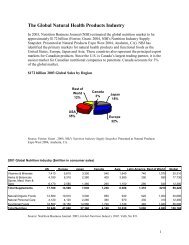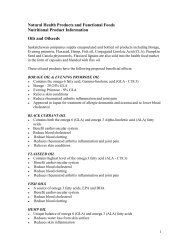Beyond Borders: Global biotechnology report 2010
Beyond Borders: Global biotechnology report 2010
Beyond Borders: Global biotechnology report 2010
You also want an ePaper? Increase the reach of your titles
YUMPU automatically turns print PDFs into web optimized ePapers that Google loves.
Moderated by:<br />
Gil Forer<br />
Ernst & Young LLP<br />
<strong>Global</strong> Director, Cleantech<br />
Mark Bandak<br />
Blackstone Advisory<br />
Partners<br />
Managing Director<br />
Olivier Mace<br />
BP Biofuels<br />
Head of Strategy<br />
& Regulatory Affairs<br />
Bill Haywood<br />
LS9<br />
CEO<br />
William Roe<br />
Coskata<br />
President and CEO<br />
Roundtable on biofuels<br />
Embracing the future<br />
98 <strong>Beyond</strong> borders <strong>Global</strong> <strong>biotechnology</strong> <strong>report</strong> <strong>2010</strong><br />
One of the most dynamic applications of <strong>biotechnology</strong> today is the production<br />
of fuels from renewable biological sources, known as biofuels. A host of factors<br />
are propelling biofuels development — rapid population growth around the world,<br />
burgeoning middle classes with increased purchasing power in emerging economies<br />
such as China and India, energy security concerns and the effort to combat climate<br />
change. These factors point to a growth in global energy demand and the need for a<br />
suite of new, clean energy sources such as biofuels to meet it. To gain a perspective<br />
on the current direction and outlook for biofuels, Ernst & Young convened a panel of<br />
industry participants representing an emerging innovative biofuel producer, a large<br />
energy company and leading biofuel investors to offer their views.<br />
Forer: What are the critical components in managing the supply of sustainable<br />
alternative fuels?<br />
Haywood: I think there are a couple of critical points in managing the supply chain.<br />
The idea is not to have to spend a lot of money on infrastructure for new fuels. In other<br />
words, we’re making fuels that exist today, such as clean diesels that do not require<br />
expensive modifications to product delivery systems or engines. Because of some of the<br />
breakthroughs in synthetic biology, we can actually control the product make very closely.<br />
That is, you can dial in the exact product you want to make, and there’s very little waste. So<br />
you couple minimal infrastructure changes with low-cost production, and you truly have a<br />
game-changing technology. You also have a lot of renewable feedstock in the form of sugar<br />
cane today that is not a “food for fuel” issue. When the technology to convert biomass to<br />
sugar has the correct economics, it will really open up the available feedstock opportunities.<br />
Some of the innovation breakthroughs have taken place in fatty acid biosynthesis, which<br />
has been going on in E. coli bacteria for billions of years. So they’re really at the top of<br />
the evolutionary food chain. Our ability to manipulate energy pathways in E. coli has<br />
been enabled by new equipment that’s been developed — the analytical equipment to do<br />
extremely high throughput strain analysis robotically represents a huge breakthrough,<br />
especially combined with incredible computing power — now you can look at 5,000 to<br />
10,000 different combinations overnight. It used to take months to do that. Now you can<br />
zero in much more quickly on the characteristics that you’re looking for, and then you splice<br />
those together using recombinant genetics and various other synthetic biology processes.<br />
So those are the real breakthroughs in innovation that have, at least in the biofuel arena,<br />
enabled our approach to making commercial quantities of both fuels and chemicals. These<br />
second-generation biofuels are differentiated from first-generation biofuels because they<br />
have evolved to be very high-energy molecules matching existing clean petroleum products.<br />
We focus on diesel particularly because our technology works better for more energy-dense<br />
molecules, and replacements for gasoline already exist. I think the oil and gas industry has<br />
done a great job reformulating fuels. The last frontier is to take the greenhouse gases out








